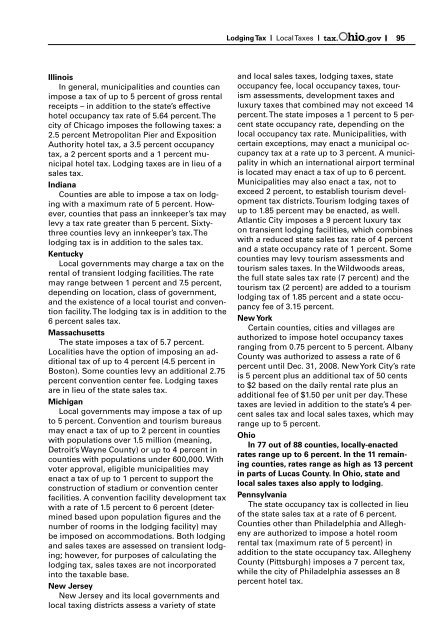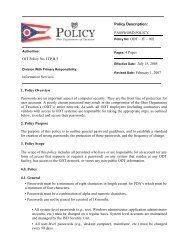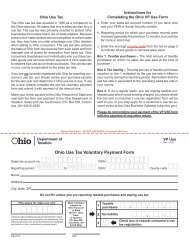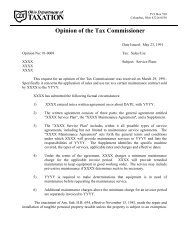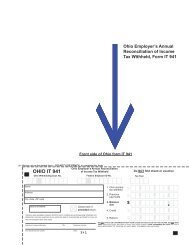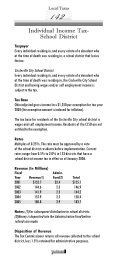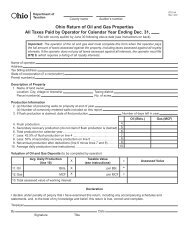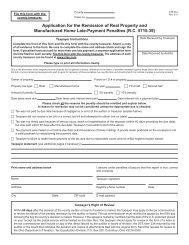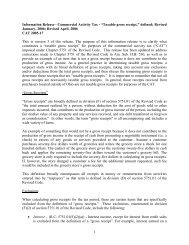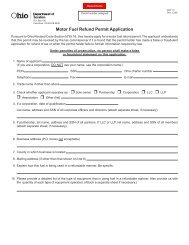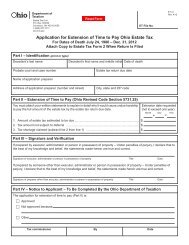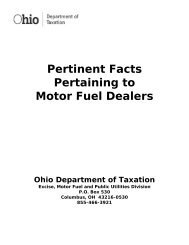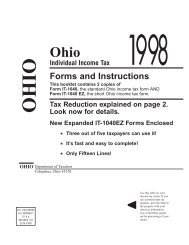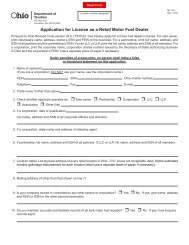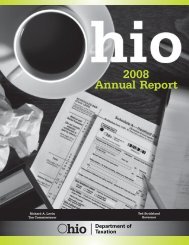Lodging Tax - Ohio Department of Taxation
Lodging Tax - Ohio Department of Taxation
Lodging Tax - Ohio Department of Taxation
You also want an ePaper? Increase the reach of your titles
YUMPU automatically turns print PDFs into web optimized ePapers that Google loves.
Illinois<br />
In general, municipalities and counties can<br />
impose a tax <strong>of</strong> up to 5 percent <strong>of</strong> gross rental<br />
receipts – in addition to the state’s effective<br />
hotel occupancy tax rate <strong>of</strong> 5.64 percent. The<br />
city <strong>of</strong> Chicago imposes the following taxes: a<br />
2.5 percent Metropolitan Pier and Exposition<br />
Authority hotel tax, a 3.5 percent occupancy<br />
tax, a 2 percent sports and a 1 percent municipal<br />
hotel tax. <strong>Lodging</strong> taxes are in lieu <strong>of</strong> a<br />
sales tax.<br />
Indiana<br />
Counties are able to impose a tax on lodging<br />
with a maximum rate <strong>of</strong> 5 percent. However,<br />
counties that pass an innkeeper’s tax may<br />
levy a tax rate greater than 5 percent. Sixtythree<br />
counties levy an innkeeper’s tax. The<br />
lodging tax is in addition to the sales tax.<br />
Kentucky<br />
Local governments may charge a tax on the<br />
rental <strong>of</strong> transient lodging facilities. The rate<br />
may range between 1 percent and 7.5 percent,<br />
depending on location, class <strong>of</strong> government,<br />
and the existence <strong>of</strong> a local tourist and convention<br />
facility. The lodging tax is in addition to the<br />
6 percent sales tax.<br />
Massachusetts<br />
The state imposes a tax <strong>of</strong> 5.7 percent.<br />
Localities have the option <strong>of</strong> imposing an additional<br />
tax <strong>of</strong> up to 4 percent (4.5 percent in<br />
Boston). Some counties levy an additional 2.75<br />
percent convention center fee. <strong>Lodging</strong> taxes<br />
are in lieu <strong>of</strong> the state sales tax.<br />
Michigan<br />
Local governments may impose a tax <strong>of</strong> up<br />
to 5 percent. Convention and tourism bureaus<br />
may enact a tax <strong>of</strong> up to 2 percent in counties<br />
with populations over 1.5 million (meaning,<br />
Detroit’s Wayne County) or up to 4 percent in<br />
counties with populations under 600,000. With<br />
voter approval, eligible municipalities may<br />
enact a tax <strong>of</strong> up to 1 percent to support the<br />
construction <strong>of</strong> stadium or convention center<br />
facilities. A convention facility development tax<br />
with a rate <strong>of</strong> 1.5 percent to 6 percent (determined<br />
based upon population fi gures and the<br />
number <strong>of</strong> rooms in the lodging facility) may<br />
be imposed on accommodations. Both lodging<br />
and sales taxes are assessed on transient lodging;<br />
however, for purposes <strong>of</strong> calculating the<br />
lodging tax, sales taxes are not incorporated<br />
into the taxable base.<br />
New Jersey<br />
New Jersey and its local governments and<br />
local taxing districts assess a variety <strong>of</strong> state<br />
<strong>Lodging</strong> <strong>Tax</strong> Local <strong>Tax</strong>es<br />
tax. hio.gov<br />
95<br />
and local sales taxes, lodging taxes, state<br />
occupancy fee, local occupancy taxes, tourism<br />
assessments, development taxes and<br />
luxury taxes that combined may not exceed 14<br />
percent. The state imposes a 1 percent to 5 percent<br />
state occupancy rate, depending on the<br />
local occupancy tax rate. Municipalities, with<br />
certain exceptions, may enact a municipal occupancy<br />
tax at a rate up to 3 percent. A municipality<br />
in which an international airport terminal<br />
is located may enact a tax <strong>of</strong> up to 6 percent.<br />
Municipalities may also enact a tax, not to<br />
exceed 2 percent, to establish tourism development<br />
tax districts. Tourism lodging taxes <strong>of</strong><br />
up to 1.85 percent may be enacted, as well.<br />
Atlantic City imposes a 9 percent luxury tax<br />
on transient lodging facilities, which combines<br />
with a reduced state sales tax rate <strong>of</strong> 4 percent<br />
and a state occupancy rate <strong>of</strong> 1 percent. Some<br />
counties may levy tourism assessments and<br />
tourism sales taxes. In the Wildwoods areas,<br />
the full state sales tax rate (7 percent) and the<br />
tourism tax (2 percent) are added to a tourism<br />
lodging tax <strong>of</strong> 1.85 percent and a state occupancy<br />
fee <strong>of</strong> 3.15 percent.<br />
New York<br />
Certain counties, cities and villages are<br />
authorized to impose hotel occupancy taxes<br />
ranging from 0.75 percent to 5 percent. Albany<br />
County was authorized to assess a rate <strong>of</strong> 6<br />
percent until Dec. 31, 2008. New York City’s rate<br />
is 5 percent plus an additional tax <strong>of</strong> 50 cents<br />
to $2 based on the daily rental rate plus an<br />
additional fee <strong>of</strong> $1.50 per unit per day. These<br />
taxes are levied in addition to the state’s 4 percent<br />
sales tax and local sales taxes, which may<br />
range up to 5 percent.<br />
<strong>Ohio</strong><br />
In 77 out <strong>of</strong> 88 counties, locally-enacted<br />
rates range up to 6 percent. In the 11 remaining<br />
counties, rates range as high as 13 percent<br />
in parts <strong>of</strong> Lucas County. In <strong>Ohio</strong>, state and<br />
local sales taxes also apply to lodging.<br />
Pennsylvania<br />
The state occupancy tax is collected in lieu<br />
<strong>of</strong> the state sales tax at a rate <strong>of</strong> 6 percent.<br />
Counties other than Philadelphia and Allegheny<br />
are authorized to impose a hotel room<br />
rental tax (maximum rate <strong>of</strong> 5 percent) in<br />
addition to the state occupancy tax. Allegheny<br />
County (Pittsburgh) imposes a 7 percent tax,<br />
while the city <strong>of</strong> Philadelphia assesses an 8<br />
percent hotel tax.


